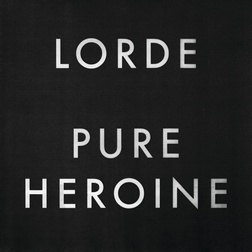
Tracklist
Other Albums by Lorde
About Pure Heroine (Extended) (2013)
Pure Heroine, the debut album by New Zealand singer-songwriter Lorde, was released on September 27, 2013, and quickly became a landmark in pop music. With its minimalist production, introspective lyrics, and distinct style, Lorde (born Ella Marija Lani Yelich-O’Connor) captured the attention of listeners worldwide and cemented her place as one of the most exciting new voices in pop. The Pure Heroine (Extended Edition) included additional tracks and provided fans with an even deeper glimpse into Lorde’s unique musical world.
Pure Heroine was initially released in New Zealand and internationally through Lava Records and Republic Records, and it didn’t take long for the album to leave an indelible mark on the music scene. Lorde was only 16 years old when she released the album, and her lyrical maturity, combined with her distinctive, haunting vocals, immediately set her apart from mainstream pop acts.
The extended edition of the album, released in the same year, included a few extra tracks that expanded on the themes already explored in the original release. As a debut, Pure Heroine was an unexpected success, earning critical acclaim and winning Best Pop Vocal Album at the 2014 Grammy Awards. The album went on to be certified Platinum in the U.S. and multiple other countries, solidifying Lorde as a pop prodigy.
Pure Heroine is defined by its minimalist production. The album, particularly in the extended version, retains the stripped-down, atmospheric sound that became Lorde’s signature. The production style is characterized by sparse beats, electronic elements, and moody basslines, leaving plenty of room for Lorde’s deep, introspective lyrics to take center stage.
Unlike the more polished, mainstream pop of the time, Pure Heroine stood out for its raw, minimalist quality. Tracks like the breakthrough single “Royals” epitomized this style. The song’s sparse beat and Lorde’s breathy, laid-back delivery of lines like “And we’ll never be royals / It don’t run in our blood” instantly resonated with listeners. It was a critique of the excesses of mainstream pop culture, and its understated production reflected the same message—where other pop songs relied on bombastic soundscapes, Lorde used subtlety to make a statement.
The extended edition of Pure Heroine didn’t stray far from this formula but added depth with additional tracks like “The Love Club” and “Bravado”, both of which carry the same air of rebellion against the ordinary and the glorification of celebrity culture. These tracks delve deeper into the human experience, offering observations about fame, youth, and the desire for freedom.
One of the standout elements of Pure Heroine is Lorde’s songwriting. At only 16 years old, she crafted lyrics that were both poetic and sharply insightful, filled with metaphors and references that were relatable to her audience, particularly young listeners, yet sophisticated enough to be appreciated by older generations as well.
“Royals” was Lorde’s breakout hit and became an anthem of sorts for the disenfranchised youth. The song’s lyrics offer a commentary on the consumerism and excess that often accompany fame. In lines like “Let me be your ruler / You can call me queen bee,” she flips the traditional notion of royalty on its head, making it a more attainable and relatable concept, even as she critiques the pursuit of wealth and status.
Other tracks like “Tennis Court” and “Ribs” continue to explore Lorde’s disillusionment with societal expectations, capturing the awkwardness, vulnerability, and existential reflection of being a teenager on the brink of adulthood. The extended edition gives fans even more to unpack, with tracks that are equally reflective but also explore the complexities of love, relationships, and self-perception.
When Pure Heroine was released, it wasn’t just a commercial success; it also had a massive cultural impact. Lorde’s blend of alternative pop and lyrical insight resonated deeply with listeners, especially in an era when pop music was often dominated by hyper-polished, club-driven hits. Her authenticity, grounded in real emotions and experiences, spoke to a generation looking for something more substantial in their music.
Songs like “Team” and “400 Lux” from the extended edition were perfect examples of Lorde’s ability to craft an intimate atmosphere while appealing to a broader audience. These songs went beyond the typical pop formula, embracing a slower, more reflective pace that allowed listeners to connect with the music on a deeper level.
Lorde’s success with Pure Heroine also paved the way for a wave of alternative pop artists, proving that there was a space for music that was both introspective and accessible. Lorde’s fresh take on pop music, where she fused electronic elements with a lo-fi aesthetic, influenced countless artists in the years that followed.
Pure Heroine remains one of the most important albums of the 2010s, defining a new era in alternative pop. With the extended edition adding a few extra songs that further showcase her artistic growth, Lorde set the stage for a long and successful career in the music industry. Since the release of Pure Heroine, Lorde has continued to push the boundaries of pop music with follow-up albums like Melodrama (2017) and Solar Power (2021), but it’s the unpolished, raw nature of her debut that continues to endear her to fans around the world.
The impact of Pure Heroine extends far beyond just chart success—its cultural resonance continues to be felt, and the album remains a touchstone in the evolution of pop music. Lorde’s ability to speak to the complexities of youth and societal pressures has made Pure Heroine a timeless classic.
Pure Heroine (Extended Edition) is a defining moment in modern pop music. From its sparse production to its clever, introspective lyrics, it introduced a bold new voice to the music scene. Lorde’s debut remains a celebration of independence, self-reflection, and the complexities of growing up in the modern world. With this album, she didn’t just capture a moment—she created a new musical landscape that continues to inspire and influence artists around the globe.